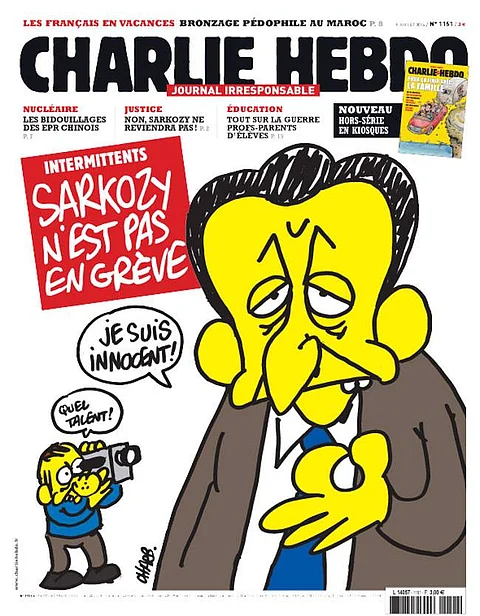

The News Minute| January 8, 2015| 2.00 pm IST
Charlie Hebdo, a French satirical weekly, was founded in 1970. It was actually founded in 1960 and was a monthly satirical magazine called Hara-Kiri which aimed to be 'inane and nasty'. The magazine was banned in France in 1970 for mocking the reverent coverage of the death of then President Charles de Gaulle. The ban didn't affect the magazine, it came back immediately under the current name Charlie Hebdo, this time as a weekly.
It is rumoured that the name Charlie was to mock the President, but the other story behind the name is that it was taken from the famous character Charlie Brown of the Peanuts comic.
In 1981 the publication was stopped owing to a financial crunch. The team raked in few more people and in 1991 made a massive comeback; the first issue selling 1,00,000 copies.
Vox reports that 'Charlie Hebdo is not broadly popular: its weekly circulation was around 50,000 (compared to about 500,000 for Le Canard Enchaîné, its better-known rival in the satirical press), and it often struggled financially.'
It was in 2006 when they published an issue showing Prophet Muhammed weeping and saying “It's hard being loved by idiots” on its cover page that it made headlines again. It produced many cartoons condemning Islamist extremism. Terming the works as “overt provocations” the then French President Jacques Chirac said that “anything that can hurt the convictions of someone else, in particular religious convictions, should be avoided.”
"It is racist to imagine that they can't understand a joke" its publisher responded when the magazine was sued by the Muslim World League and other Muslim organizations. However, this time the French President backed the magazine, for satire was a French tradition. The court acquitted the magazine.
Iconic French cartoonist Cabu, aged 76, who was killed in the attack om Thursday used was famous for his satirical characters. His best known characters was Mon Beauf (“My brother-in-law”), 'an incarnation of bovine French provincial complacency' and it poked fun at racism in France.
Its sarcasm and provocation, however, did not end. In an edition in 2011 it changed the name of the magazine in its cover page to “Charia Hebdo,” (a reference to Sharia). Its caricature of Islam was being done in a country which had the most number of Muslims in Europe.
In 2012, months after the WTC attack, when the sarcasm continued and the magazine published cartoons of Prophet Muhammad naked, the French Foreign Minister said that freedom of expression and satire was fine but was “it really sensible or intelligent to pour oil on the fire?”
And what happened on Wednesday was yet another attack on them. “We have avenged the Prophet Mohammed,” the attackers were heard shouting. Their sarcasm continues, the attack on them continues.